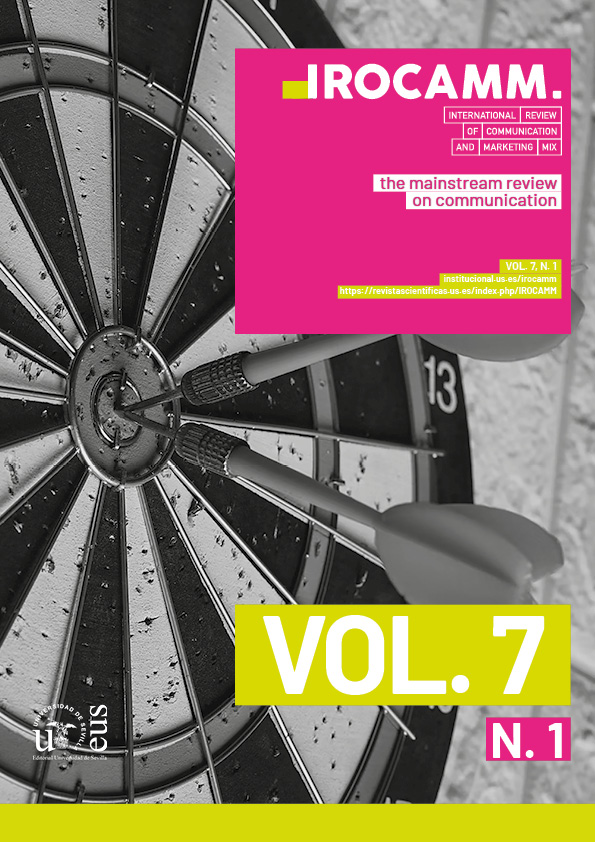Percepciones sobre discursos de género y empoderamiento en la publicidad peruana: un estudio con jóvenes universitarias
DOI:
https://doi.org/10.12795/IROCAMM.2024.v07.i01.01Palabras clave:
Femvertising, empoderamiento femenino, publicidad, percepción femenina, saturación publicitaria, marketing inclusivoResumen
Este estudio examina las percepciones de jóvenes universitarias en Perú sobre los discursos de género y empoderamiento femenino presentes en la publicidad. A través de un enfoque cualitativo, se exploran las interpretaciones y reacciones de estas jóvenes ante la representación del género en la publicidad, enfocándose en identificar los elementos que influyen en sus percepciones de autenticidad y oportunismo. El análisis revela que, dentro de estas percepciones, emerge el fenómeno del femvertising como una preocupación significativa, donde se cuestiona la sinceridad de las marcas en su compromiso con el empoderamiento femenino. Este hallazgo subraya la complejidad de la relación entre publicidad, género y cultura en el contexto peruano.
Descargas
Citas
Abitbol, A., & Sternadori, M. (2019). Championing women’s empowerment as a catalyst for purchase intentions: Testing the mediating roles of OPRs and brand loyalty in the context of femvertising. International Journal of Strategic Communication, 13(1), 22–41. https://doi.org/10.1080/1553118X.2018.1552963
Åkestam, N., Rosengren, S., & Dahlen, M. (2017). Advertising “like a girl”: Toward a better understanding of “femvertising” and its effects. Psychology and Marketing, 34(8), 795–806. https://doi.org/10.1002/mar.21023
Aksakal, M., & Schmidt, K. (2015). German country report on semi-structured interviews with temporary migrants: Asian-German transnational spaces-report for the EURA-NET project. https://pub.uni-bielefeld.de/record/2901514
Arellano Marketing. (2017). Estilos de vida: Las Modernas. https://www.arellano.pe/los-seis-estilos-de-vida/las-modernas/
BBC News Mundo. (2019, Marzo 5). Google: lo que revela el polémico análisis de igualdad salarial del gigante tecnológico entre hombres y mujeres. BBC News Mundo. https://www.bbc.com/mundo/noticias-47458780
Baxter, A. (2015). Faux Activism in Recent Female-Empowering Advertising. The Elon. Journal of Undergraduate Research in Communications, 6(1), 48–58. http://www.inquiriesjournal.com/a?id=1133
Becker-Olsen, K., Cudmore, B., & Hill, R. (2006). The impact of perceived corporate social responsibility on consumer behavior. Journal of Business Research, 59(1), 46–53. https://doi.org/10.1016/j.jbusres.2005.01.001
Becker-Herby, E. (2016). The Rise of Femvertising: Authentically Reaching Female Consumers [Master’s thesis, University of Minnesota]. https://hdl.handle.net/11299/181494
Belknap, P., & Leonard, W. M. (1991). A conceptual replication and extension of Erving Goffman’s study of gender advertisements. Sex Roles, 25(3-4), 103–118. https://doi.org/10.1007/BF00289848
Berger, J. (2023). Modos de ver. Fósforo.
Biernacki, P., & Waldorf, D. (1981). Snowball Sampling: Problems and Techniques of Chain Referral Sampling. Sociological Methods & Research, 10(2), 141–163. https://doi.org/10.1177/004912418101000205
Collins Jr, G. E., Wilson, E., Luo, M., & Surmeier, A. (2016). BIC Pens For Her. https://digitalcommons.murraystate.edu/scholarsweek/Fall2016/MME/2/
Creswell, J. (2003). 179 research Design: Qualitative. Quantitative and Mixed Methods. https://www.ucg.ac.me/skladiste/blog_609332/objava_105202/fajlovi/Creswell.pdf
Cwynar-Horta, J. (2016). The commodification of the body positive movement on Instagram. Stream: Culture/Politics/Technology, 8(2), 36–56.
Czerniawski, A. M. (2022). “Real” bodies in plus-size fashion. Fat Studies, 11(3), 231–243. https://doi.org/10.1080/21604851.2021.1913827
Fox-Kirk, W., Gardiner, R. A., Finn, H., & Chisholm, J. (2020). Genderwashing: The myth of equality. Human Resource Development International, 23(5), 586–597. https://doi.org/10.1080/13678868.2020.1801065
García-Jiménez, J. V., Ruiz-de-Maya, S., & López-López, I. (2017). The impact of congruence between the CSR activity and the company’s core business on consumer response to CSR. Spanish Journal of Marketing-ESIC, 21(s1), 26–38. https://doi.org/10.1016/j.sjme.2017.01.001
Garrido, R. (2020). El ‘body positive’ e Instagram, ¿Es compatible promover el amor propio en la red social del culto al cuerpo? 20 minutos. https://www.20minutos.es/noticia/4344411/0/el-body-positive-e-instagram-es-compatible-promover-el-amor-propio-en-la-red-social-del-culto-al-cuerpo/
Gerard, K. (2019). Rationalizing “gender-wash”: Empowerment, efficiency and knowledge construction. Review of International Political Economy, 26(s5), 1022–1042. https://doi.org/10.1080/09692290.2019.1625423
Illouz, E. (2020). El fin del amor: una sociología de las relaciones negativas (Vol. 3104). Katz Editores.
Inglehart, R. (1997). Modernization and postmodernization: Cultural, economic, and political change in 43 societies. Princeton University Press. https://doi.org/10.2307/j.ctv10vm2ns
Jiménez-Marín, G., Simancas-González, E., & González-Oñate, C. (2022). La publicidad: Estructura de la industria en España. Del cliente a la agencia (y viceversa). Pirámide.
Kent, M. (2015). The power of storytelling in public relations: Introducing the 20 master plots. Public Relations Review, 41(4), 480–489. https://doi.org/10.1016/j.pubrev.2015.05.011
Mamuric, N. (2019). Femvertising: Advertising taking social responsibility to sell brands. Journal of Brand Strategy, 7(4), 318–325.
Menéndez, M. I. (2020). «You’re made of what you do»: Impulso del deporte femenino a través de estrategias de femvertising en Nike. Retos: nuevas tendencias en educación física, deporte y recreación, 38, 425–432. https://doi.org/10.47197/retos.v38i38.76959
Mensa, M., & Grow, J. M. (2023). Women are survivors: Public services announcements on violence against women in Latin America. Violence Against Women, 29(6-7), 1252–1274. https://doi.org/10.1177/10778012221104509
Palomo-Domínguez, I., Jiménez-Marín, G., & Valenzuela, N. S. G. (2023). Social Media Strategies for Gender Artivism: A Generation of Feminist Spanish Women Illustrator Influencers. Information & Media, 98, 23–52. https://doi.org/10.15388/Im.2023.98.61
Saldaña, J. (2011). Fundamentals of qualitative research. Oxford University Press.
Sánchez-Riaño, V., Arango Lozano, C. A., & Sojo-Gómez, J. R. (2022). Centennials: La búsqueda del ser en un universo digital. IROCAMM -. International Review Of Communication And Marketing Mix, 5(1), 9–20. https://doi.org/10.12795/IROCAMM.2021.v05.i01.01
Saucedo Espinosa, F., & Sánchez Garza, J. A. (2021). Periodismo digital: Reconfigurando los modelos de negocio y representando un nicho de mercado para emprendedores. IROCAMM -. International Review Of Communication And Marketing Mix, 2(4), 81–92. https://doi.org/10.12795/IROCAMM.2021.v02.i04.07
Simancas González, E. (2019). La formación feminista como arma para combatir la publicidad sexista. Hachetetepé. Revista científica de educación y comunicación, (18), 47–59. https://doi.org/10.25267/Hachetetepe.2019.v1.i18.6
Sterbenk, Y., Champlin, S., Windels, K., & Shelton, S. (2022). Is Femvertising the New Greenwashing? Examining Corporate Commitment to Gender Equality. Journal of Business Ethics, 177, 491–505. https://doi.org/10.1007/s10551-021-04755-x
Vandellos, E., Villarroya, A., & Boté-Vericad, J.-J. (2023). ¿Qué sabemos de la femvertising? Una revisión sistemática de la literatura. Cuadernos.Info, (56), 185–205. https://doi.org/10.7764/cdi.56.61527
Varghese, N., & Kumar, N. (2020). Feminism in advertising: Irony or revolution? A critical review of femvertising. Feminist Media Studies, 22(2), 1–19.
Walters, R. (2021). Varieties of gender wash: Towards a framework for critiquing corporate social responsibility in feminist IPE. Review of International Political Economy, 29(5), 1–24.
Windels, K., Champlin, S., Shelton, S., Sterbenk, Y., & Poteet, M. (2019). Selling Feminism: How Female Empowerment Campaigns Employ Postfeminist Discourses. Journal of Advertising, 49(1), 1–16.
Publicado
Cómo citar
Número
Sección
Licencia
Derechos de autor 2023 IROCAMM - International Review Of Communication And Marketing Mix

Esta obra está bajo una licencia internacional Creative Commons Atribución-NoComercial-CompartirIgual 4.0.
International Review Of Communication And Marketing Mix proporciona un acceso sin restricciones a su contenido desde el momento de su publicación en esta edición electrónica, y por lo tanto es una revista de acceso abierto. Los originales publicados en esta revista son propiedad de la Universidad de Sevilla y es obligatorio citar su origen en cualquier reproducción total o parcial. Todos los contenidos se distribuyen bajo una licencia Creative Commons - No comercial - Attribution Share Alike 4.0 (CC BY-NC-SA 4.0). Esto debe indicarse expresamente de esta manera cuando sea necesario. Puede consultar la versión informativa y el texto legal de la licencia.
Los autores que publican en esta revista están de acuerdo con los siguientes términos:
- La cesión de derechos se hace bajo la licencia Creative Commons.
- Los autores pueden hacer por separado arreglos adicionales para la distribución no exclusiva de la versión de la obra publicada en la revista (por ejemplo, colocándola en un depósito institucional o publicándola en un libro), con un reconocimiento de su publicación inicial en esta revista.
- Se permite y alienta a los autores a difundir su trabajo electrónicamente (por ejemplo, en repositorios institucionales o en su propio sitio web) antes y durante el proceso de presentación, ya que ello puede dar lugar a intercambios productivos, así como a una citación más temprana y amplia de los trabajos publicados.
- La difusión de los artículos se llevará a cabo en las redes sociales generales, ResearchGate, Mendeley, Academia.edu, Cosis, e-lis y otras bases de datos o repositorios de textos completos en Internet con los que la revista establece un acuerdo para su difusión y visibilidad.
- El derecho de autor es de dos tipos: los derechos morales y los derechos patrimoniales. Los derechos morales son prerrogativas perpetuas, irrenunciables, intransferibles, inalienables, inembargables e imprescriptibles. Los derechos patrimoniales se refieren a los beneficios obtenidos por el uso o la divulgación de las obras. La IROCAMM - Revista Internacional de Comunicación y Marketing Mix está autorizada exclusivamente a realizar o autorizar por cualquier medio la utilización, distribución, difusión, reproducción, adaptación, traducción o transformación de la obra...
International Review Of Communication And Marketing Mix does no cobra honorarios por la presentación de trabajos, ni tampoco por la publicación de sus artículos.
























